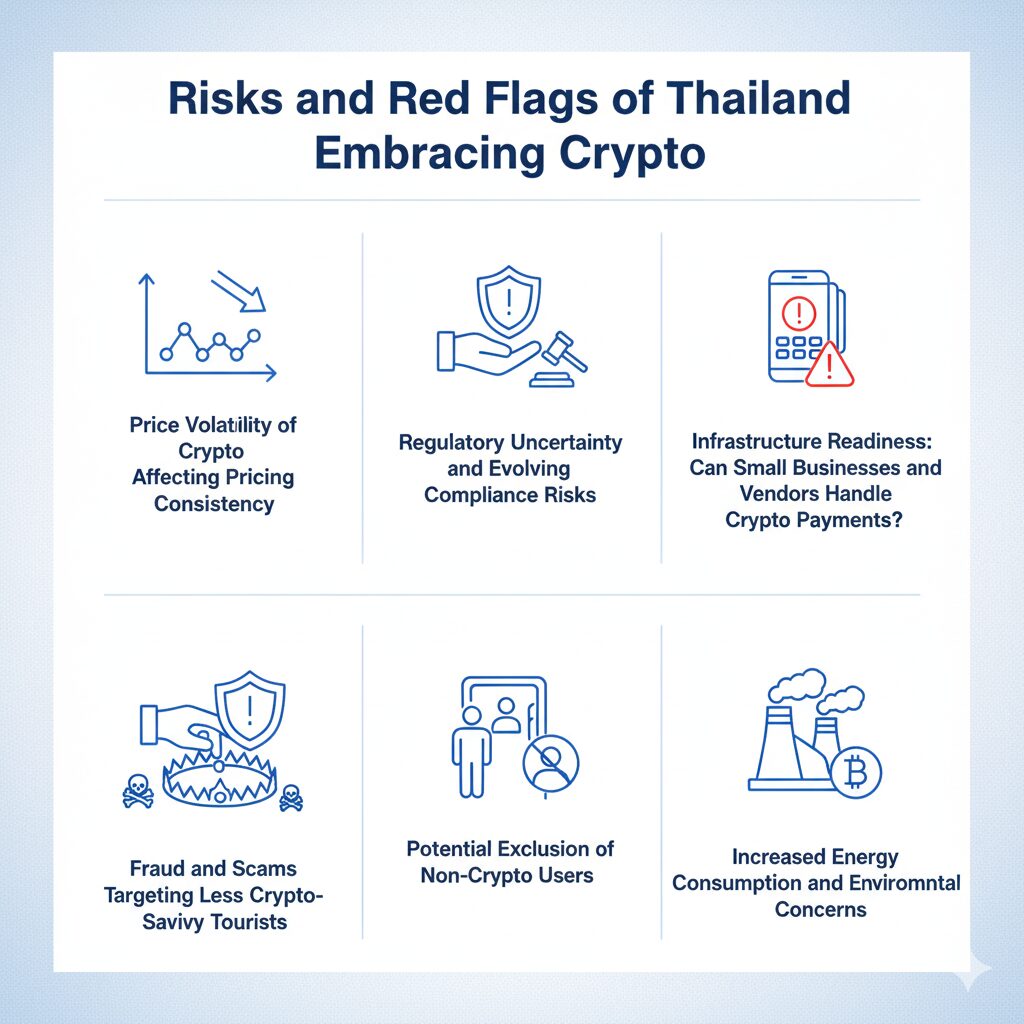Thailand is embarking on a groundbreaking initiative to integrate cryptocurrency into its tourism sector. Announced on May 26, 2025, by Deputy Prime Minister and Finance Minister Pichai Chunhavajira, the country plans to allow international tourists to spend digital assets via credit card-linked platforms. In this system, tourists can link their crypto holdings to credit cards for local spending.
This approach aims to modernize Thailand’s financial system and embrace digital assets, positioning the nation as a forward-thinking destination for tech-savvy travellers. By facilitating crypto payments, Thailand seeks to attract a new demographic of tourists and stimulate economic growth in the post-pandemic era.
However, this bold move raises important questions: Will integrating cryptocurrency into tourism significantly boost visitor numbers and spending? Or could it introduce complexities and risks that outweigh the potential benefits?
Why Thailand Is Embracing Crypto in Tourism
Thailand is strategically integrating cryptocurrency into its tourism sector to rejuvenate its economy, attract tech-savvy travellers, and solidify its position as a regional crypto hub.
Revitalizing Tourism Post-COVID-19
The COVID-19 pandemic significantly impacted Thailand’s tourism industry, a vital component of its economy. In response, the Thai government is implementing innovative measures to modernize and revitalize this sector.
One such initiative is allowing tourists to spend cryptocurrencies via credit card-linked platforms, where merchants receive payments in Thai Baht, minimizing foreign exchange risks and simplifying transactions.
Attracting Crypto-Savvy Travellers and Digital Nomads
By embracing cryptocurrency payments, Thailand aims to appeal to a growing demographic of digital nomads and crypto-enthusiasts. This move positions Thailand as a forward-thinking destination that caters to the preferences of modern travellers seeking flexibility and innovation in their financial transactions.
Establishing a Regional Crypto Hub
Thailand’s efforts extend beyond tourism; the country is actively pursuing a broader digital asset strategy. Initiatives include merging traditional and digital asset markets, launching tokenized government bonds (G-Tokens), and creating regulatory sandboxes for blockchain innovation. These steps demonstrate Thailand’s commitment to becoming a leading crypto-friendly nation in Southeast Asia.
By integrating cryptocurrency into its tourism sector and broader financial system, Thailand is not only enhancing its appeal to international visitors but also laying the groundwork for a more diversified and resilient economy.
Potential Benefits of Thailand Embracing Crypto
As Thailand embraces crypto payments for tourists, the nation is pioneering a bold fusion of digital finance and travel that could reshape its tourism industry and economic future.
Increased Tourism Revenue from a Broader, Tech-Forward Demographic
By enabling crypto payments, Thailand can attract a new wave of tourists, particularly younger, tech-savvy travellers and digital nomads who prefer using digital assets. This demographic often has higher spending power and an affinity for innovation, potentially boosting overall tourism revenue.
Frictionless Payments for International Visitors Avoiding FX Hassles
Crypto-linked payment platforms allow tourists to spend without worrying about currency exchange rates or high conversion fees. Transactions settle instantly in Thai Baht for merchants, simplifying the payment process and enhancing the visitor experience.
Innovation Branding: Thailand Positioning Itself as a Forward-Looking Destination
Adopting cryptocurrency payments signals Thailand’s commitment to technological progress and modernization. This bold step helps the country stand out among regional competitors, appealing to innovators and early adopters worldwide.
Support for Local Businesses Through Fast, Borderless Transactions
Local merchants benefit from quicker settlements and reduced reliance on traditional banking infrastructure. This can improve cash flow and reduce costs associated with international payments, helping small businesses thrive in the global tourism market.
Enhanced Financial Inclusion and Digital Literacy
Integrating crypto payments encourages both locals and tourists to engage with digital finance, fostering greater financial inclusion. It also promotes digital literacy, which is crucial for Thailand’s long-term economic development in an increasingly digital world.
Catalyst for Broader Blockchain Adoption Across Sectors
By piloting crypto payments in tourism, Thailand creates a real-world use case that can accelerate blockchain adoption in other industries such as retail, finance, and real estate. This can stimulate innovation, investment, and economic diversification beyond tourism.
Risks and Red Flags of Thailand Embracing Crypto
While embracing crypto payments offers exciting possibilities for Thailand’s tourism, it also brings significant risks and challenges that must be carefully managed.

Price Volatility of Crypto Affecting Pricing Consistency
Cryptocurrencies are notoriously volatile, with values that can swing dramatically within hours or days. For merchants accepting crypto payments, this creates a challenge: how to price goods and services fairly when the value of the currency received can quickly fluctuate.
Without effective hedging or instant conversion to Thai Baht, businesses risk losing money, while tourists may feel uncertainty about the actual cost of their purchases.
Regulatory Uncertainty and Evolving Compliance Risks
The legal landscape surrounding cryptocurrencies is rapidly changing worldwide. In Thailand, new regulations or stricter enforcement could affect how crypto payments are processed, reported, or taxed.
Sudden regulatory shifts may disrupt operations or discourage merchants from fully embracing crypto, leading to uncertainty for tourists and local businesses alike. Staying compliant may also increase administrative burdens and costs.
Fraud and Scams Targeting Less Crypto-Savvy Tourists
As crypto payments become mainstream in tourism, less experienced travellers may become targets for scams such as fake wallet apps, phishing attacks, or deceptive exchange rates.
Lack of proper consumer protection or awareness campaigns could result in financial losses for tourists and damage to Thailand’s reputation as a safe, welcoming destination.
Infrastructure Readiness: Can Small Businesses and Vendors Handle Crypto Payments?
Accepting cryptocurrency requires reliable payment gateways, internet access, and knowledgeable staff. Small vendors, especially in rural or less-developed tourist areas, may lack the technical infrastructure or training to smoothly process crypto transactions.
This could lead to delays, errors, or refusals that frustrate visitors and reduce overall trust in the system.
Potential Exclusion of Non-Crypto Users
While crypto payments attract a niche group of tech-forward travellers, many tourists still rely exclusively on cash or traditional cards. Overemphasizing digital assets without ensuring seamless alternatives may alienate or inconvenience a significant portion of visitors, limiting the policy’s inclusivity and effectiveness.
Increased Energy Consumption and Environmental Concerns
Certain cryptocurrencies, especially those using proof-of-work consensus like Bitcoin, consume large amounts of energy. Promoting crypto payments without addressing these environmental concerns might conflict with Thailand’s commitment to sustainability.
This could deter environmentally conscious travellers and raise criticism from global observers focused on climate impact.
Global Context: Are Other Countries Doing This?
Several countries around the world have taken bold steps to integrate cryptocurrency into their tourism and broader economies, offering valuable lessons for Thailand’s new crypto payment initiative.
El Salvador: The First to Adopt Bitcoin as Legal Tender
El Salvador made headlines in 2021 by becoming the first country to adopt Bitcoin as legal tender. This move aimed to boost financial inclusion, attract investment, and increase tourism.
While it attracted significant global attention and some crypto enthusiasts, the country also faced challenges, including public skepticism, technical issues with the government’s Bitcoin wallet (Chivo), and volatility impacting everyday transactions.
El Salvador’s experience highlights the importance of robust infrastructure, clear communication, and public education when integrating crypto into mainstream economic activities.
RELATED: Lessons Learned From El Salvador’s Bitcoin Experiment
Dubai: Aiming to Become a Crypto and Blockchain Hub
Dubai has positioned itself as a global crypto and blockchain-friendly city, promoting crypto tourism through various initiatives such as allowing crypto payments for certain services, hosting blockchain events, and developing a regulatory framework to support digital assets.
Dubai’s approach emphasizes gradual integration with strong government backing and collaboration with the private sector, which helps reduce risks and build investor and tourist confidence. Its focus on combining innovation with regulation offers Thailand a model for balancing progress with oversight.
What Thailand Could Learn, or Avoid, from Their Experiences
Thailand can benefit from studying these examples by prioritizing infrastructure readiness and public education to avoid the pitfalls of user confusion and technical failures seen in El Salvador.
Emphasizing clear, transparent regulations and fostering public-private partnerships, as Dubai has done, can help Thailand create a more sustainable and secure crypto-tourism ecosystem.
Additionally, Thailand should remain cautious about market volatility and ensure that traditional payment options remain available to avoid excluding non-crypto users.
Is This a Smart Strategy or Tourism Gamble?
Adopting cryptocurrency payments in tourism can be a forward-thinking strategy that aligns with Thailand’s broader goals of economic modernization and digital innovation. By embracing crypto, Thailand positions itself as a leader in integrating emerging technologies, attracting a new generation of travellers who prioritize digital convenience and innovation.
This move could stimulate fintech development, create new business opportunities, and strengthen Thailand’s reputation as a progressive destination in Southeast Asia. Additionally, crypto payments can streamline cross-border transactions, reduce reliance on traditional banking systems, and promote financial inclusion, important factors in driving long-term economic growth.
Despite its potential, the timing of this initiative raises concerns. Crypto markets remain highly volatile, and global regulatory frameworks are still uncertain, exposing Thailand to financial and legal risks. There is also the question of infrastructure readiness: many small businesses and rural vendors may lack the technology or expertise to effectively handle crypto payments, potentially undermining the visitor experience.
Moreover, the novelty of crypto payments might affect traditional tourists who prefer familiar payment methods. Without comprehensive education campaigns and robust consumer protections, Thailand could face issues related to fraud or user confusion, which may damage trust in both tourism and the broader crypto ecosystem.
Final Thoughts
Thailand’s move to integrate cryptocurrency payments into its tourism sector is a bold and innovative step that could redefine the country’s economic landscape and attract a new wave of tech-savvy travellers. However, the ultimate success of this initiative will heavily depend on the timing and quality of its execution. Without careful planning, clear regulations, and robust infrastructure, the risks of volatility, fraud, and exclusion could overshadow the potential benefits.
To ensure this visionary strategy pays off, Thailand must focus on balanced regulation that protects users and businesses while encouraging innovation. Equally important is investing in the technical readiness of merchants and educating tourists on crypto usage. By addressing these challenges head-on, Thailand can set a global example for how digital assets and tourism can thrive together in a secure and sustainable way.
Disclaimer: This article is intended solely for informational purposes and should not be considered trading or investment advice. Nothing herein should be construed as financial, legal, or tax advice. Trading or investing in cryptocurrencies carries a considerable risk of financial loss. Always conduct due diligence.
If you would like to read more articles like this, visit DeFi Planet and follow us on Twitter, LinkedIn, Facebook, Instagram, and CoinMarketCap Community.
Take control of your crypto portfolio with MARKETS PRO, DeFi Planet’s suite of analytics tools.”









